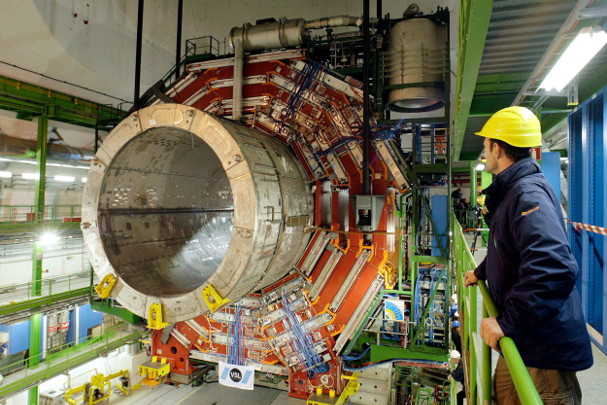
The Large Hadron Collider at CERN cost more than US$10 billion to build. Credit: epa european pressphoto agency b.v. / Alamy Stock Photo
Debate on China's super collider heats up
19 October 2016

epa european pressphoto agency b.v. / Alamy Stock Photo
The Large Hadron Collider at CERN cost more than US$10 billion to build.
Proponents say the mega facility would contribute to major science breakthroughs if built.
As scientists in China continue to debate whether the country should build a super collider, policy experts urge a comprehensive evaluation of the economic viability of the nation’s mega science facilities.
Since 2013, scientists at the Institute of High-energy Physics (IHEP), part of the Chinese Academy of Sciences (CAS), have been lobbying policymakers in China to fund a US$20 billion mega science facility consisting of a circular electron positron collider (CEPC) and a super proton-proton collider (SPPC). The CEPC-SPPC could more accurately measure the Higgs boson – first detected by scientists in 2012 using the Large Hadron Collider (LHC) – and other known particles with its CEPC section, while exploring unknown particles with the SPPC component.
China has made clear its ambition to host mega scientific facilities. Its US$180 million Five-hundred-meter Aperture Spherical radio Telescope (FAST), the world’s largest radio telescope used to detect interstellar communication signals, was completed on September 25, 2016.
The country’s super collider plan had not been widely noticed by the public until early September, when the 94-year-old Nobel Prize-winning physicist Chen-Ning Yang published an article on the popular Chinese social media site, Intellectuals, voicing strong opposition to the CEPC-SPPC’s construction. Yang warned that China risked repeating the mistakes of the United States, which attempted to build a superconducting super collider in the 1990s but cancelled the project due to rising costs and other factors.
Yang said the cost of building a facility in China, especially given the country’s developing economy, along with the project’s uncertain scientific goals, were compelling reasons to abandon the plan. “Building the LHC has lasted many years and the construction cost just over US$10 billion,” wrote Yang.
But proponents say that as well its potential to facilitate major science breakthroughs, the facility would have significant flow-on effects for local industry, including the development of high-tech manufacturing to build the collider.
A turning point
Yifang Wang, the IHEP director, responded to Yang’s objections in an open letter, saying the rising dominance of Chinese scientists’ in high-energy physics, the country’s science-friendly regime, and the CEPC-SPPC’s two-step plan (building SPPC after successfully launching the easier-to-construct CEPC) were evidence the super collider’s proposal should go ahead.
Wang also referred to IHEP’s experience building and operating the Beijing Electron Positron Collider, says China has the skills to construct the CEPC-SPPC. “Many foreign scientists are very interested in joining [the CEPC-SPPC project]. If the Chinese government approves this project, these scientists will push their own governments [to share the costs],” Wang told Nature Index, in response to Yang’s criticism of the huge cost burden.
In the past four years, China's output of high-quality papers in the physical sciences has continued to rise.
On October 18, IHEP and its collaborators convened at the Xiangshan Science Conference, a semi-public series of workshops the kind of which are often aimed at persuading top scientists and policymakers to support frontier scientific projects.
Insiders say the Chinese government might not be as enthusiastic as scientists. The National Development and Reform Commission (NDRC), which approves most of China’s mega projects, did not approve funding for a large-scale trial to test the practical feasibility of the super collider.
Zhicong Shang, a professor of science policy at Beijing-based University of CAS, says the debate surrounding CEPC-SPPC highlighted the need to more comprehensively evaluate the socioeconomic consequences of mega science projects. “The key is not about science, but about whether China is financially and economically ready to build such a big scientific project,” Shang told Nature Index.
“The debate is a significant thing in the history of China’s science policy making,” he adds.
Jie Lu, an associate professor of physics at Shanghai University, supports the idea of building the super collider, but says China lacks the necessary talents and capacity to build a proton-proton collider. He also believes the CEPC-SPPC’s promised benefits to the national economy and high-tech development might be dampened if China cannot produce many sophisticated parts of the mega device.
